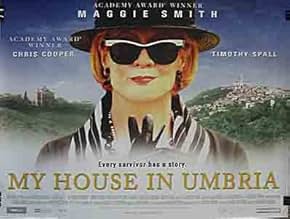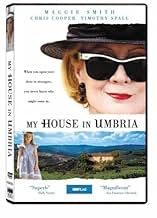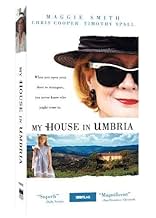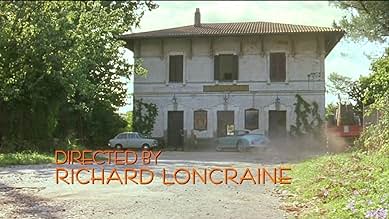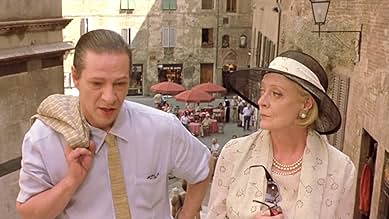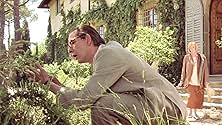CALIFICACIÓN DE IMDb
6.9/10
3.8 k
TU CALIFICACIÓN
Agrega una trama en tu idiomaAn unlikely group of people find solace and friendship after being thrown together in the wake of a terrorist attack.An unlikely group of people find solace and friendship after being thrown together in the wake of a terrorist attack.An unlikely group of people find solace and friendship after being thrown together in the wake of a terrorist attack.
- Dirección
- Guionistas
- Elenco
- Ganó 1 premio Primetime Emmy
- 4 premios ganados y 27 nominaciones en total
Alison Cameron Adam
- General's Daughter
- (as Alison Adam)
Vittoria Colonna
- Young Woman
- (as Vittoria Colonna Di Stigliano)
- Dirección
- Guionistas
- Todo el elenco y el equipo
- Producción, taquilla y más en IMDbPro
Opiniones destacadas
Having just seen this film in the cinema, I have to say it didn't flag at all, and it was graced by one of Maggie Smith's greatest performances - and which fully deserved her Emmy award. The film dramatises the necessary illusions with which we need to live our lives. For Emily Delahunty, alcohol and the escapism of the romance fiction she writes are the props to her very existence. To keep sane the illusion of happiness sometimes is necessary to keep going. And yet, out of tragedy comes the hint of salvation: some kind of family, and a girl who becomes a symbol of how she can have hope for the future. This is not a cosy film, as some misguided critics have labelled it. It is not gardens, Italy, cups of tea: it is a film of illusion, escapism, isolation and the human spirit in the face of tragedy and death. Released in the UK after the quaint "Ladies in Lavender" it was unfortunately seen by the critics as exactly the same kind of film - and so missing the point completely.
Playing the troubled alcoholic, a vulnerable ageing romance novelist, Smith is on amazing form. Never mannered, she is perfect in her second role in a William Trevor novella (her first was in the 1984 "Mrs Silly" for ITV in the UK, for which she was nominated for a BAFTA). Using those expressive eyes, and a crushed, occasionally slurred voice, she draws you into the film. If this makes me sound like a Smith groupie, I have to point out that I disliked intensely this actress's mannered caricatures in such films as "Tea with Mussolini" or "Washington Square" (though, faced with the awful scripts, maybe she decided just to push it for laughs...). That is why she deserves recognition for this film: she reminds us that, with the right material, she can be the best - and not just the witty old bat in "Gosford Park" or the the stern teacher in "Harry Potter". After Smith's Emmy award, it was criminal that Meryl Streep robbed Dame Maggie at the Golden Globes for her raiding of the dressing-up box in "Angels in America".
For the supporting cast, Ronnie Barker, Timothy Spall, and Chris Cooper are all superb: understated, natural, and working in a brilliant ensemble. They have such rapport with Smith that the film just whizzes by.
Playing the troubled alcoholic, a vulnerable ageing romance novelist, Smith is on amazing form. Never mannered, she is perfect in her second role in a William Trevor novella (her first was in the 1984 "Mrs Silly" for ITV in the UK, for which she was nominated for a BAFTA). Using those expressive eyes, and a crushed, occasionally slurred voice, she draws you into the film. If this makes me sound like a Smith groupie, I have to point out that I disliked intensely this actress's mannered caricatures in such films as "Tea with Mussolini" or "Washington Square" (though, faced with the awful scripts, maybe she decided just to push it for laughs...). That is why she deserves recognition for this film: she reminds us that, with the right material, she can be the best - and not just the witty old bat in "Gosford Park" or the the stern teacher in "Harry Potter". After Smith's Emmy award, it was criminal that Meryl Streep robbed Dame Maggie at the Golden Globes for her raiding of the dressing-up box in "Angels in America".
For the supporting cast, Ronnie Barker, Timothy Spall, and Chris Cooper are all superb: understated, natural, and working in a brilliant ensemble. They have such rapport with Smith that the film just whizzes by.
This is quiet gem of a film. The storyline is basic, almost simplistic, but the direction allows the actors to add value where it counts.
Maggie Smith is delightful as the aged authoress, with a penchant for Grappa who, after a bomb explodes on a train, offer the survivors of her compartment, recuperation at her home in Umbria.
The Italian countryside is simply magnificent, the photography of Maggie Smith's villa and its surrounds(or should I say Mrs Delahunter's villa) gives a beautiful feeling of a somewhat tired place of residence for a somewhat tired individual, who has been there and done that but in a rather upper class British way. There are the usual disparate individuals coming to terms (or not?) with their their problems and then we have the police inspector, trying to suss whether any of the 'guests' can help. Unfortunately this aspect of the film, particularly the dealings with the police inspector, adds little and if anything detracts from the story. It is a necessary component but I feel could have been integrated better.
The supporting cast, particularly Ronnie Barker and Timothy Spall, add to the ambiance of the film and its quiet charm.
Why only seven out of ten? The direction I think is a little too light in that if it were not for the calibre of the actors, this might have been a poor 'B' Movie, but perhaps that is what the Director intended by letting good acting raise the film beyond its basic storyline.
This is now shown on TV, so give yourselves a treat, forget being a film reviewer and just soak up the acting and the atmosphere. If it is not on your local TV, it is worth renting for a night - just make sure you and you partner(it is essential that you and your partner watch this together) have a nice chilled glass of a sparkling Italian wine and indulge in quiet, but thoroughly pleasant entertainment.
Maggie Smith is delightful as the aged authoress, with a penchant for Grappa who, after a bomb explodes on a train, offer the survivors of her compartment, recuperation at her home in Umbria.
The Italian countryside is simply magnificent, the photography of Maggie Smith's villa and its surrounds(or should I say Mrs Delahunter's villa) gives a beautiful feeling of a somewhat tired place of residence for a somewhat tired individual, who has been there and done that but in a rather upper class British way. There are the usual disparate individuals coming to terms (or not?) with their their problems and then we have the police inspector, trying to suss whether any of the 'guests' can help. Unfortunately this aspect of the film, particularly the dealings with the police inspector, adds little and if anything detracts from the story. It is a necessary component but I feel could have been integrated better.
The supporting cast, particularly Ronnie Barker and Timothy Spall, add to the ambiance of the film and its quiet charm.
Why only seven out of ten? The direction I think is a little too light in that if it were not for the calibre of the actors, this might have been a poor 'B' Movie, but perhaps that is what the Director intended by letting good acting raise the film beyond its basic storyline.
This is now shown on TV, so give yourselves a treat, forget being a film reviewer and just soak up the acting and the atmosphere. If it is not on your local TV, it is worth renting for a night - just make sure you and you partner(it is essential that you and your partner watch this together) have a nice chilled glass of a sparkling Italian wine and indulge in quiet, but thoroughly pleasant entertainment.
I reserve 10 out of ten for "Tea With Mussolini". Dame Maggie gives another outstanding performance as a writer who encounters a bomb on a train. It was a way to introduce the 4 main characters (not including the fabulous Quinty) who we come to love. The clever voice overs weave a beautiful thread (by Maggie of course) tieing together a story of mutual care and affection. Mrs Delahunty loves a drink or 15 and her hospitality extends to anyone within her reach. Has she become a lonely old lady who just wants company in her secluded villa? Does it really matter that there may be a dark secret amongst her guests? No! The outside dinner scene the night before the girl Aimee was due to leave was stunning. I so hoped she wouldn't go and that the "family" would stay together........
I'd wath this again and again and will add it to my extensive collection. GO DAME MAGGIE!
I'd wath this again and again and will add it to my extensive collection. GO DAME MAGGIE!
The movie was wonderful. 'My House in Umbria' was like a fresh breath of Italian countryside air, or taking a bite into a delicious pie in a terrace in Italy. The sites were breathtaking, even if they were seen from my television. The story was understandable and intriguing. The characters were fun. Mrs. Delahunty, a romantic novelist, with her numerous names and vibrant personality; i found myself wanting to be like her - minus the excessive drinking and smoking. There were also the many friends she had made on a train which had been in an accident. These strangers put together in Mrs.Delahunty's villa. Werner, the general, and Aimee (a young face who was very captivating on screen), and Quinty. All these characters truly made the film. BUT the only stain in the wonderful fabric that is this movie was Chris Cooper's character, Mr. Tom River-something. I found him rather pompus but a necessary element in the movie. I can't find more words to describe the movie. The scenes of Italian cities and towns were wonderful. oh, and mrs.delahunty's thoughts were well illustrated on screen. All in all i truly liked the movie. I think this movie will delight many people.
The HBO TV movie "My House in Umbria" should be seen primarily for the complex and layered performance of divine Maggie Smith. As romance novelist Emily Delahunty, she projects an image of refinement and elegance that conceals a deeper, darker self. That self is revealed slowly, and we find hidden within a character that is not only at variance with Miss Delahunty's adopted persona, but also very different from the prim and proper ladies Maggie Smith habitually plays on the silver screen. We see that Miss Smith is capable even of being seductive and slatternly, most unlike her many repressed and spinsterish roles.
Maggie Smith has the kind of mesmerizing voice and marvelous diction that would enable her to entertain film audiences by reading the proverbial telephone book. I am reminded of Glenda Jackson's (virtual) one-woman show in "Stevie" and Joanne Woodward's voice-over of "The Age of Innocence".
The rest of the characters in "My House in Umbria" are, alas, a motley crew, sketched in only very lightly, merely second bananas to Maggie Smith's central figure. The time of the story is difficult to pin down based on the clothes and motor cars, but one imagines it takes place during the 1970s, the era of the Bader-Meinhof gang in Germany and the Red Brigades in Italy. The denouement is a little too pat, but the journey is still well worth our while.
One of the key questions raised in the film is what anger would drive a human being to commit an act of terror. But it becomes quickly apparent that political terrorism is not the only kind of "man's inhumanity to man" that is intended here. The focus is, rather, on innocence shattered and destroyed, the cruelty visited by individuals upon each other, the sense of guilt that it engenders, and the possibility of forgiveness and redemption that always, always exists if we "seize the day" and allow ourselves to be happy.
Maggie Smith has the kind of mesmerizing voice and marvelous diction that would enable her to entertain film audiences by reading the proverbial telephone book. I am reminded of Glenda Jackson's (virtual) one-woman show in "Stevie" and Joanne Woodward's voice-over of "The Age of Innocence".
The rest of the characters in "My House in Umbria" are, alas, a motley crew, sketched in only very lightly, merely second bananas to Maggie Smith's central figure. The time of the story is difficult to pin down based on the clothes and motor cars, but one imagines it takes place during the 1970s, the era of the Bader-Meinhof gang in Germany and the Red Brigades in Italy. The denouement is a little too pat, but the journey is still well worth our while.
One of the key questions raised in the film is what anger would drive a human being to commit an act of terror. But it becomes quickly apparent that political terrorism is not the only kind of "man's inhumanity to man" that is intended here. The focus is, rather, on innocence shattered and destroyed, the cruelty visited by individuals upon each other, the sense of guilt that it engenders, and the possibility of forgiveness and redemption that always, always exists if we "seize the day" and allow ourselves to be happy.
¿Sabías que…?
- TriviaMrs. Emily Delahunty's (Dame Maggie Smith's) car is an Alfa Romeo 6C-2500, produced between 1947 and 1953. It is a five-seat touring car popular with affluent post-war customers interested in a sporty yet comfortable vehicle.
- Citas
Mrs. Emily Delahunty: In the garden, delphiniums were in flower. Through scented twilight, the girl in the white dress walked with a step as light as a morning cobweb. That evening she hadn't a care in the world.
Selecciones populares
Inicia sesión para calificar y agrega a la lista de videos para obtener recomendaciones personalizadas
Detalles
- Fecha de lanzamiento
- Países de origen
- Sitio oficial
- Idiomas
- También se conoce como
- Mitt hus i Umbrien
- Locaciones de filmación
- Productoras
- Ver más créditos de la compañía en IMDbPro
Taquilla
- Total a nivel mundial
- USD 1,324,900
- Tiempo de ejecución1 hora 43 minutos
- Color
- Mezcla de sonido
- Relación de aspecto
- 1.85 : 1
Contribuir a esta página
Sugiere una edición o agrega el contenido que falta

Principales brechas de datos
By what name was My House in Umbria (2003) officially released in Canada in English?
Responda
